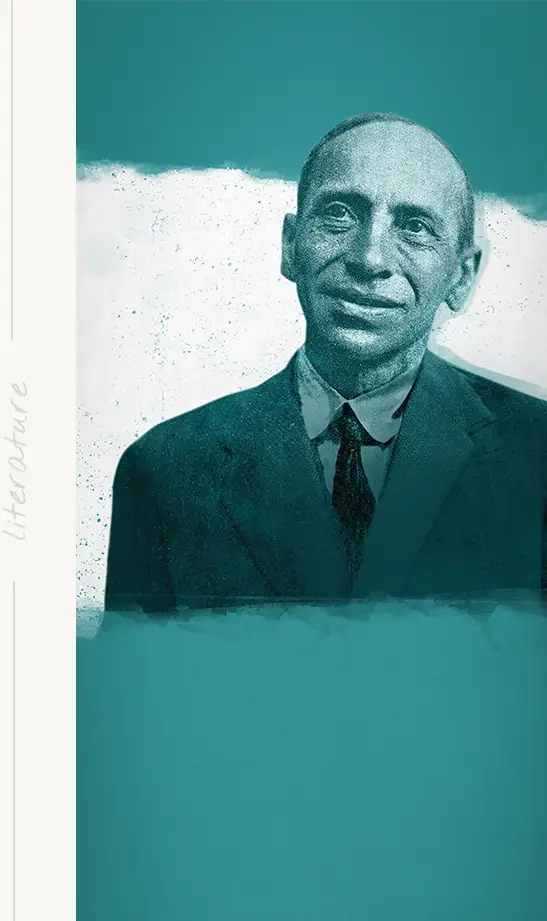
Mordechaj Gebirtig
4 V 1877, Kraków — 4 VI 1942, Kraków Ghetto
Mordechaj Gebirtig, a poet and author of Yiddish songs in pre- and wartime Poland, is closely identified with Kazimierz, the Jewish quarter of Cracow.
He was born in Cracow on 4 May 1877 as Markus Bertig. His education consisted of attending kheder, the basic Jewish religious school, and a public school. Subsequently, he became an apprentice to a master carpenter who taught him the trade. He worked actively to improve the living standards of workers through socialism, which is apparent in his literary works. During World War I, he served as a paramedic in a military hospital in Cracow. Thereafter, he worked in the carpentry and upholstery workshop owned by his brother Leon. He also tried his hand at acting.
As his career developed, he began to call himself Mordechaj Gebirtig, a surname which indicated that he was in the process of being “born again”, taken from the German noun Geburt, or “birth” in English. His first poem, Der Generalshtrayk (‘General Strike’), was published in 1905 in a weekly newspaper, Sotsyaldemokrat (‘Social Democrat’). A book of his poems Folkshtimlekh (‘Folk Tunes’) was published in 1920, and a book of his collected songs, Mayne lider (‘My Songs’), in 1936. His works, written in Yiddish, have been sung on the stage of many Jewish theatres in many parts of the world. Mordechaj Gebirtig wrote the iconic Holocaust song, Unzer shtetl brent (‘Our Town Is Burning’), commemorating the pogrom in Przytyk on 9 March 1936. It became the hymn of the Jewish Combat Organization and was sung in the Cracow Ghetto and other concentration camps. After the war, it became a symbolic anthem for Holocaust survivors.
During the occupation, he was first confined to Łagiewniki near Cracow and then removed to the Cracow Ghetto. He died on 4 June 1942, shot by a Gestapo officer on the way to the extermination camp. Mordechaj Gebirtig’s songs documenting pre-war Jewish life have become priceless relics of a lost world.
creativity
creativity
—
Our Town Is Burning („Undser shtetl brent”)
Voice: Bente Kahan
Accordion: Dariusz Świnoga
Translated into English by Dahlia Pfeffer Luxemburg
Recording of a concert in Stockholm City Hall, 1995.
It’s burning brothers, it’s burning
Oh, our poor town is burning
Angry winds and loud noises
Are coming crushing and blowing away
The wild flames are growing
Everything around is burning!
And you are standing just like that and watching with folded arms
And you are standing just like that and watching
Our town is burning!
It’s burning, brothers, it’s burning
Oh, our poor town is burning
The fire tongues have already engulfed the whole town
And the evil winds are screaming
Our town is burning
And you’re standing just like that and watching with folded arms
And you’re standing just like that and watching
Our town is burning!
It’s burning, brothers, it’s burning
Oh, God forbid, the moment is coming
that our town together with us
will turn in flames into ashes
and, like after a battle, only empty, black walls will remain
And you’re standing just like that and watching with folded arms
And you’re standing just like that and watching
Our town is burning!
It’s burning brothers, it’s burning
And only you can help it
If the town is dear to you,
Take the buckets, put out the flames
Put them out with your own blood!
Show that you can do it!
Don’t stand, put out the fire
Our town is burning!
Farewell Cracow. Bente Kahan sings Mordechaj Gebirtig
Text und Musik: Mordechaj Gebirtig
Gesang: Bente Kahan
Akkoredon: Dariusz Świnoga
Geige: Mirosław Kuźniak
Aufnahme von TVP2, 1992.
Reyzale
Translated from Yiddish into English by Bente Kahan
I am standing in a street
carefully I take a peek
at that old and wooden home
where Reyzl lives, my dearest one
each night before her house her heyzl
I walk by and hum
whistle and then call out Reyzl,
Come, Come, Come
A window suddenly unlocks
the little house is waking up
A sweet voice sounding in the street
my Reyzale she starts to speak
“Wait a while, it’s mother’s order
soon I will be free
walk once more around the corner
One, Two, Three”
Happily I take a walk
cracking nuts, I sing. I talk
Then hear my sweet Reyzale
runs down a staircase-ale
lovingly, I look her way
embrace my only one
kiss her on her forehead and say:
Come, Come, Come
“Dovidl, I’m begging you,
whistle is not a thing to do
“I hear he’s whistling” says my Mum
she’s so upset and won’t be calm
“whistling, she says, is not Jewish
for them it may be
Just give a simple sign in Yiddish
One, Two, Three
“I will not whistle as you say
I promise you that from today
I will become a religious Jew
because I am in love with you
Every Shabes, my dear Reyzl
I will please your Mum
praying in that little kleyzl
Come, Come, Come”
“I believe you, oh my lad
and that’s why, dear Dovidl
I’m knitting a nice tfiln-bag
with a David star, mogin-Dovidl
If your classmates they will like it
say it is from me
that Reyzale my love she knits in
One, Two, Three”
“A present, thanks, that’s really sweet,
Oh, Reyzale, I love you so
I love your mother, I love your street,
I love your home, please do not go
I love your little house, your heyzl
that’s where you are from
But now your mother’s shouting “Reyzl:
Come, Come, Come”
Once again I start to walk
cracking nuts, I sing, I talk
Then I hear my dearest one
runs up the stairs, I’m left alone
The street is calm so it seems
my Reyzl is back home
Come to me in my dreams, Oh
Come, Come, Come
